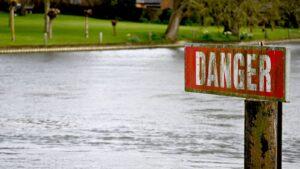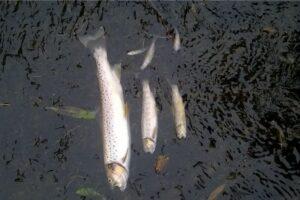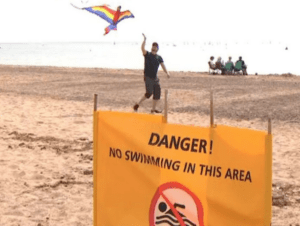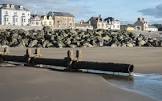- History man - 3rd March 2026
- British Broadcasting Complaint (BBC) - 3rd March 2026
- Rocket man - 2nd March 2026
 Shock news that water firm bosses could face up to two years in prison over sewage, chemical and manure infested waterways, highlights major questions about the company in Wales.
Shock news that water firm bosses could face up to two years in prison over sewage, chemical and manure infested waterways, highlights major questions about the company in Wales.
After extensive research using figures from Dŵr Cymru Welsh Water (DC WW), it has been declared online: “Welsh Water always make a profit. Their directors can earn up to 100% bonus!
“They are correct that they don’t have shareholders but they do have Bond holders who have funded 3.8 billion pounds.
“These bonds are traded on the Luxembourg’s Bourse so no need to disclose shareholders!

“Who does own Welsh Water? Last year correct they didn’t pay dividends, but they did pay £347 million to these bond holders! Some of these bond holders are receiving a fixed rate of 6% others are receiving RPI currently 3.5% +4.4% =7.9% Now you try getting that return on a blue chip investment!”.

The latest worrying details about sewage and other waste, relate to companies in England, but this research puts DC WW firmly in the spotlight too.
Apart from facing up to two years in jail, water company executives could also be banned from taking bonuses.


Yet in Wales the situation is already questionable, because DC WW has made headlines for all the wrong reasons.
Last October it was revealed that there had been more than 200 breaches recorded by Natural Resources Wales (NRW) including sewage spills and water quality ‘offences’, however the firm had been fined just TWICE!
In total by that month, the regulator had recorded 223 breaches by DC WW since the start of 2018, according to data from Freedom of Information (FoI) requests by Violation Tracker and shared with WalesOnline (WO).

James Tennet, of the Dawnstalkers Penarth (DP) swimming group, said it was “deeply depressing to see the extent of environmental harm” caused by the supplier, adding: “As this data shows, they are doing a terrible job at keeping our waterways clean and safe, and still not taking the problem seriously enough… Natural Resources Wales needs to play the role of a real regulator by issuing fines and prosecutions rather than toothless warnings”.
 The week before this was published The BBC had reported how DC WW had been illegally spilling untreated sewage at dozens of treatment plants for years, including an environmentally protected area near a rare dolphin habitat in Cardigan, and the company has accepted it had between 40 and 50 wastewater treatment plants operating in breach of permits.
The week before this was published The BBC had reported how DC WW had been illegally spilling untreated sewage at dozens of treatment plants for years, including an environmentally protected area near a rare dolphin habitat in Cardigan, and the company has accepted it had between 40 and 50 wastewater treatment plants operating in breach of permits.

According to the information shared with WO one of the worst-performing plants is in that town, where the outflow point spills into the Teifi estuary near a dolphin area.
Alun Moseley, of Surfers Against Sewage (SAS), said it was a “national scandal” that a special area of conservation had seen sewage spilled for more than 200 days each year between 2019 and 2022.


One of the two prosecutions by NRW came in 2019 when DC WW was ordered to pay £49,150 at Swansea Magistrates’ Court after admitting to a chemical discharge which killed more than 500 fish near its Felindre waterworks.
The other saw the company told to pay £205,871 at Llandudno Magistrates’ Court in 2021 after pleading guilty to causing a pollution incident along the River Clywedog.

A nine kilometre stretch of the river was affected as crude settled sewage spilled from the Five Fords wastewater treatment plant and killed more than 3,000 fish.
According to the data, DC WW’s other infringements include a Site of Special Scientific Interest (SSSI) offence, a waste offence under the Environmental Protection Act (EPA), and a breach of the Salmon and Freshwater Fisheries Act.

Responding to criticism over the number of prosecutions, Gavin Bown of NRW warned: “While we do prosecute in appropriate cases, the fines handed down by the courts go back to the UK Treasury and not to remediate the environmental problem”.
When there is heavy rain, a wastewater treatment plant is allowed to discharge untreated sewage so it does not become overwhelmed. But releasing any before a plant reaches the overflow level is an illegal breach of its permit. DCWW has admitted between 40 and 50 of its plants are breaching their permits.

The new Water (Special Measures) Bill is designed to beef up feeble regulators so the UK Government can take on water companies releasing sewage into rivers, lakes and seas and appease public fury.
The bill, which could come into effect in the New Year, would increase fines and could see water executives who fail to cooperate or obstruct investigations, such as being slow to provide data, thrown in jail.

Although many topline measures had already been announced, the new details have been cautiously welcomed by green groups as an “important first step” towards cleaning up filthy rivers, lakes and seas.
They say. though, that there is a long way to go given many other problems with the waterways, and the UK Government has acknowledged the need for “wider reform”.

Perhaps the online researcher will also call for ‘wider reform’ in Wales, if he started his report with the words: “Whats wrong with Welsh Water..?, and the consumer will have seen appalling headlines…
The memories of our Editor Phil Parry’s astonishing 41 year award-winning career in journalism (when essential research was often reported), as he was gripped by the rare neurological condition Hereditary Spastic Paraplegia (HSP), have been released in a major book ‘A GOOD STORY’. Order the book now!

Tomorrow – how during 41 years in journalism (when he was trained to use simple language, avoiding jargon) reporting police failures has always been central for our Editor, Welshman Phil Parry (who spent 23 years with the BBC), and now this is underlined by news of misdeeds in TWO forces, with a Times leader headlined: ‘Failed and Failed Again’.











